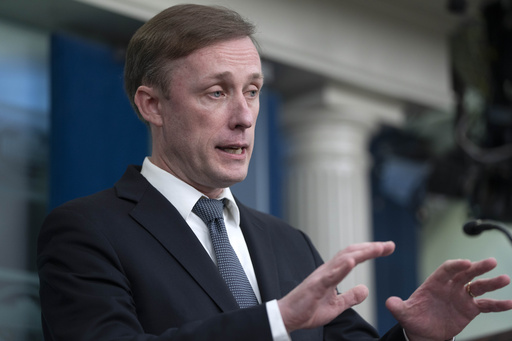WASHINGTON (AP) — The White House said Tuesday it is preparing additional “major sanctions” on Russia in response to opposition leader Alexei Navalny’s death last week in an Arctic penal colony.
National Security Adviser Jake Sullivan said the sanctions, on the eve of the two-year anniversary of Russia’s invasion of Ukraine, “will be a substantial package covering a range of different elements of the Russian defense industrial base, and sources of revenue for the Russian economy that power Russia’s war machine, that power Russia’s aggression, and that power Russia’s repression.”
National Security Council spokesman John Kirby said the U.S. had not determined how Navalny had died, but insisted that the ultimate responsibility lay with Putin.
“Regardless of the scientific answer, Putin’s responsible for it,” he told reporters.
Russian authorities have said the cause of Navalny’s death is still unknown and have refused to release his body for the next two weeks as the preliminary inquest continues, members of his team said.
The Treasury Department declined to comment on the details of the upcoming sanctions. Brian Nelson, the department’s Under Secretary for Terrorism and Financial Intelligence, is in Europe this week to continue working on Russia sanctions ahead of the invasion’s two-year anniversary.
“The global coalition imposing unprecedented sanctions on Russia’s war machine has thrown sand in the gears of the Kremlin’s efforts to equip and supply its military. President Biden recently expanded Treasury’s authorities to target those funding Russia’s war production efforts – even if they’re located in third countries – and Treasury is aggressively pursuing those who attempt to evade our sanctions,” the Treasury department said last week. “Multilateral sanctions and export controls have forced hard tradeoffs for Putin and damaged his ability to project power now and in the future.”
So far, the U.S. and its allies have sanctioned thousands of Russian people and firms, frozen Russian Central Bank funds, banned certain Russian goods, restricted Russian banks’ access to SWIFT — the dominant system for global financial transactions — and imposed a $60-per-barrel price cap on Russian oil and diesel, among other measures.
Policy experts have advanced an array of proposals meant to further starve Russia of the money it needs to continue its invasion — from seizing the nation’s Central Bank funds housed largely in Europe to lowering the Group of Seven price cap in Russian oil.
A February working paper from the International Working Group on Russian Sanctions at Stanford University calls for heavier sanctions in Russia’s energy market – from lowering the current $60 price cap on Russian-produced oil to $30, as well as completing the EU and G7 ban on Russian hydrocarbons.
Asked about more sanctions on Russia during a Council on Foreign Relations media briefing Tuesday, Stephen Sestanovich, a senior fellow for Russian and Eurasian studies at the organization, said “the choices are rather limited — but it’s not zero.”
Sestanovich said it is also possible that the U.S. and allies could lower the price cap on Russian oil, since it is an area where “the U.S. and EU have not been particularly aggressive.”
“They could try to go lower and put the squeeze on and force the Russians to sell more oil at a discount,” he said, adding that he anticipates the U.S. to impose more personal sanctions on Russian officials.
Charles Kupchan, also a CFR senior fellow and professor of international affairs at Georgetown University said, “sanctions are always in the quiver, but they’re not going to matter that much — because let’s be honest, the sanctions have not had a huge impact on the Russian economy.”
“What will make a big difference is military and economic assistance to Ukraine, full stop,” Kupchan said.


